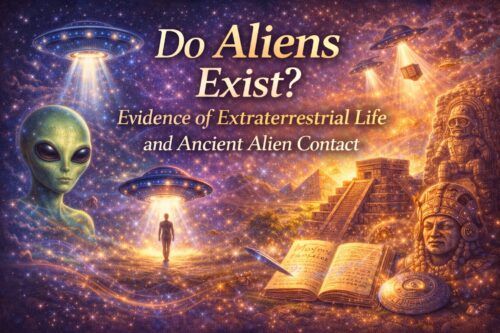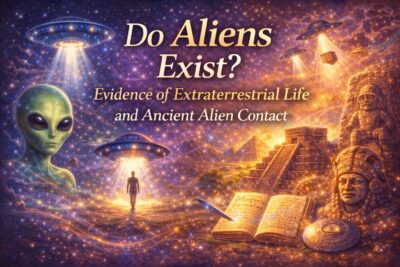Extraterrestrial Enigma: A Definitive Guide to the Search for Alien Life and UFOs
Introduction: For centuries, the question, “Are we alone in the universe?” has captivated human imagination, fueled countless stories, and driven scientific exploration. The vastness of space, with its trillions of stars and potentially habitable planets, makes the possibility of life beyond Earth seem not just plausible, but likely. Yet, despite widespread UFO sightings and a wealth of ancient myths, definitive, scientific proof of alien existence remains elusive. This article will serve as a comprehensive guide to the ongoing quest for extraterrestrial life. We’ll delve into the most compelling evidence, explore the leading theories about why they might visit Earth, and examine the scientific and historical context behind the world’s greatest cosmic mystery.
Decoding the Evidence: UFOs, Ancient History, and the Search for Life
The modern search for alien life is a complex field that blends scientific inquiry with anecdotal evidence and historical analysis. While mainstream science has yet to confirm a single extraterrestrial visit, the sheer volume of unexplained phenomena and historical accounts provides fertile ground for speculation and research.
- The Unidentified Flying Object (UFO) Phenomenon: For many, the most compelling evidence for alien visitation comes in the form of UFOs, now officially referred to by the U.S. government as Unidentified Aerial Phenomena (UAPs). Countless sightings have been reported by credible witnesses, including commercial pilots, military personnel, and private citizens. These accounts often describe objects moving at impossible speeds, making abrupt turns, and defying the known laws of physics. While the majority of these sightings are eventually explained by natural phenomena, weather balloons, or advanced human technology, a small percentage remains officially unidentified. For many, these unexplained cases represent the strongest argument for an extraterrestrial presence on Earth. However, scientists are quick to point out that “unidentified” does not automatically mean “alien.” The lack of a conventional explanation for a sighting is not conclusive evidence of an extraterrestrial source.
- Ancient Astronauts and Historical Anomalies: Another fascinating line of inquiry is the theory that extraterrestrials visited Earth in our distant past. Proponents of the Ancient Astronaut Theory point to unexplained elements in human history and archeology as evidence. They suggest that ancient civilizations, lacking the technology to create monumental structures like the Egyptian pyramids, the Nazca Lines in Peru, or Stonehenge in England, must have received assistance from an advanced civilization. While these theories are captivating, mainstream archaeologists and historians overwhelmingly reject them, arguing that these achievements were the result of human ingenuity, skill, and sheer manpower. Nonetheless, these historical mysteries continue to fuel the debate and keep the public engaged in the possibility of alien influence.
- The Search for Extraterrestrial Intelligence (SETI): The scientific community, meanwhile, focuses on a more systematic and rigorous approach. Projects like SETI use massive radio telescopes to scan the cosmos, listening for signals that could indicate a technological civilization. While the universe is vast, and the search has only just begun, the lack of any confirmed signal so far is often cited in the Fermi Paradox—the contradiction between the high probability of extraterrestrial life and the lack of observable evidence. This paradox serves as a central pillar in the scientific debate, forcing researchers to consider why, if aliens exist, we haven’t found any yet.
Unlocking the Motive: The Most Common Theories on Alien Purpose
If we assume for a moment that aliens have visited Earth, the next logical question is, “Why?” There are countless theories, ranging from the optimistic to the apocalyptic. Most of these hypotheses reflect our own hopes and fears about humanity’s place in the cosmos.
- The Friendly Visitor or Observer Theory: Many believe that if aliens exist and are advanced enough to reach us, they are likely to be benevolent. This theory suggests that extraterrestrials might visit Earth to observe our development, exchange knowledge, or offer assistance in overcoming our most pressing global challenges, such as war, climate change, or disease. This optimistic view, often found in science fiction, envisions a peaceful exchange of ideas that could help humanity evolve and join a larger cosmic community.
- The Resource Extractor or Colonizer Theory: A more cautious theory suggests that extraterrestrials might not be benevolent. They could be intergalactic prospectors, visiting Earth to exploit its abundant resources. This theory is rooted in our own history of exploration and colonization. The fear is that a technologically superior civilization could view Earth as nothing more than a new frontier to be conquered or mined for its resources, with little regard for its inhabitants.
- The “Zoo Hypothesis” and Non-Interference Theory: Perhaps the most intriguing theory is the idea that aliens are not here to help or harm us, but to simply observe us. The Zoo Hypothesis suggests that Earth is part of a larger galactic community but has been quarantined or set aside as a kind of “cosmic zoo.” The extraterrestrials, in this view, are watching us from a distance, following a prime directive of non-interference, allowing our civilization to evolve on its own without their influence. This theory helps explain the Fermi Paradox by suggesting that aliens might be here, but we’re not technologically or socially ready to meet them.
- The Spiritual and Mystical Purpose: Beyond the scientific and historical theories, some believe that extraterrestrial beings have a spiritual purpose. These theories suggest that aliens are not just physical beings but are highly evolved spiritual entities. They may be here to guide humanity’s spiritual awakening, impart wisdom, or even act as our cosmic ancestors. This view, often found in new-age philosophies and spiritual movements, reinterprets UFO sightings as a form of divine intervention or spiritual guidance.
Extraterrestrial Technology: What Could It Look Like?
Discussions about aliens are incomplete without speculation on their technology. The reported capabilities of UFOs—including instantaneous acceleration, silent flight, and the ability to maneuver in ways that defy our understanding of physics—suggest that any visiting civilization possesses technology far beyond our own.
- Harnessing Alternative Physics: Alien technology may not rely on conventional propulsion systems like rockets and jets. Instead, it might be based on a deeper understanding of fundamental forces, such as gravity or electromagnetism. For example, some theories suggest that advanced civilizations could manipulate spacetime itself, creating warp drives or wormholes that allow for near-instantaneous travel across vast cosmic distances.
- Energy and Communication: The ability to travel between star systems would require an energy source far more powerful than anything we currently possess. Advanced aliens might have mastered nuclear fusion, harnessed the power of black holes, or discovered a way to tap into the very fabric of the universe for energy. Similarly, their communication could involve forms of light, thought, or even quantum entanglement, allowing for instant, intergalactic communication.
- The Unknowable: The most important consideration is that we are likely limited by our own human understanding. Alien technology could be based on principles that we haven’t even discovered yet. The physicist Michio Kaku famously said, “Any sufficiently advanced technology is indistinguishable from magic.” If extraterrestrials exist, their technology might appear magical to us, simply because we lack the theoretical framework to comprehend it.
Conclusion: The Enduring Search for the Truth

The mystery of alien existence remains one of humanity’s most enduring questions. While there is no definitive, irrefutable proof of extraterrestrial life, the sheer possibility continues to inspire, challenge, and unite people across the globe. The search for aliens isn’t just about finding another life form; it’s about finding our place in the universe. It forces us to look beyond our own planet and consider what it means to be human in a cosmos that is almost certainly teeming with life.
Until new evidence emerges, the debate will continue to be fueled by a mix of scientific rigor, eyewitness accounts, and a healthy dose of human curiosity. Whether the truth lies in the depths of our oceans, the ancient ruins of our ancestors, or the outer reaches of a distant galaxy, the search for extraterrestrial life will continue to be a testament to our insatiable desire to know if we are, in fact, alone.
